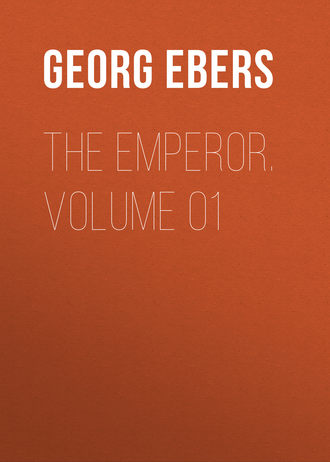
Georg Ebers
The Emperor. Volume 01
"Day is the present merely, and the future is evolved out of darkness; the corn grows from the clods of the field; the rain falls from the darkest clouds; a new generation is born of the mother's womb; the limbs recover their vigor in sleep. And what is begotten of the darkness of death—who can tell?"
When, after saying this, the Emperor had remained for some time silent, the youth asked him:
"But if the sunrise teaches you nothing concerning the future why should you so often break your night's rest and climb the mountain to see it?"
"Why? Why?" repeated Hadrian, slowly and meditatively, stroking his grizzled beard; then he went on as if speaking to himself:
"That is a question which reason fails to answer, before which my lips find no words; and, if I had them at my command, who among the rabble would understand me? Such questions can best be answered by means of parables. Those who take part in life are actors, and the world is their stage. He who wants to look tall on it wears the cothurnus, and is not a mountain the highest vantage ground that a man can find for the sole of his foot? Kasius there is but a hill, but I have stood on greater giants than he, and seen the clouds rise below me, like Jupiter on Olympus."
"But you need climb no mountains to feel yourself a god," cried Antinous; "the godlike is your title—you command and the world must obey. With a mountain beneath his feet a man is nearer to heaven no doubt than he is on the plain."
"Well?"
"I dare not say what came into my mind."
"Speak out."
"I knew a little girl who when I took her on my shoulder would stretch out her arms and exclaim, 'I am so tall!' She fancied that she was taller than I then, and yet was only little Panthea."
"But in her own conception of herself, it was she who was tall, and that decides the issue, for to each of us a thing is only that which it seems to us. It is true they call me godlike, but I feel every day, and a hundred times a day, the limitations of the power and nature of man, and I cannot get beyond them. On the top of a mountain I cease to feel them; there I feel as if I were great, for nothing is higher than my head, far or near. And when, as I stand there, the night vanishes before my eyes, when the splendor of the young sun brings the world into new life for me, by restoring to my consciousness all that just before had been engulfed in gloom, then a deeper breath swells my breast, and my lungs fill with the purer and lighter air of the heights. Up there, alone and in silence, no hint can reach me of the turmoil below, and I feel myself one with the great aspect of nature spread before me. The surges of the sea come and go, the tree-tops in the forest bow and rise, fog and mist roll away and part asunder hither and thither, and up there I feel myself so merged with the creation that surrounds me that often it even seems as though it were my own breath that gives it life. Like the storks and the swallows, I yearn for the distant land, and where should the human eye be more likely to be permitted, at least in fancy, to discern the remote goal than from the summit of a mountain?
"The limitless distance which the spirit craves for seems there to assume a form tangible to the senses, and the eye detects its border line. My whole being feels not merely elevated, but expanded, and that vague longing which comes over me as soon as I mix once more in the turmoil of life, and when the cares of state demand my strength, vanishes. But you cannot understand it, boy. These are things which no other mortal can share with me."
"And it is only to me that you do not scorn to reveal them!" cried Antinous, who had turned round to face the Emperor, and who with wide eyes had not lost one word.
"You?" said Hadrian, and a smile, not absolutely free from mockery, parted his lips. "From you I should no more have a secret than from the Cupid by Praxiteles, in my study at Rome."
The blood mounted to the lad's cheeks and dyed them flaming crimson. The Emperor observed this and said kindly:
"You are more to me than the statue, for the marble cannot blush. In the time of the Athenians Beauty governed life, but in you I can see that the gods are pleased to give it a bodily existence, even in our own days, and to look at you reconciles me to the discords of existence. It does me good. But how should I expect to find that you understand me; your brow was never made to be furrowed by thought; or did you really understand one word of all I said?"
Antinous propped himself on his left arm, and lifting his right hand, he said emphatically:
"Yes."
"And which," asked Hadrian.
"I know what longing is."
"For what?"
"For many things."
"Tell me one."
"Some enjoyment that is not followed by depression. I do not know of one."
"That is a desire you share with all the youth of Rome, only they are apt to postpone the reaction. Well, and what next?"
"I cannot tell you."
"What prevents your speaking openly to me?"
"You, yourself did."
"I?"
"Yes, you; for you forbid me to speak of my home, my mother, and my people."
The Emperor's brow darkened, and he answered sternly:
"I am your father and your whole soul should be given to me."
"It is all yours," answered the youth, falling back on to the bear-skin, and drawing the pallima closely over his shoulders, for a gust blew coldly in at the side of the tent, through which Phlegon, the Emperor's private secretary, now entered and approached his master. He was followed by a slave with several sealed rolls under his arms.
"Will it be agreeable to you, Caesar, to consider the despatches and letters that have just arrived?" asked the official, whose carefully- arranged hair had been tossed by the sea-breeze.
"Yes, and then we can make a note of what I was able to observe in the heavens last night. Have you the tablets ready?"
"I left them in the tent set up especially for the work, Caesar."
"The storm has become very violent."
"It seems to blow from the north and east both at once, and the sea is very rough. The Empress will have a bad voyage."
"When did she set out?"
"The anchor was weighed towards midnight. The vessel which is to fetch her to Alexandria is a fine ship, but rolls from side to side in a very unpleasant manner."
Hadrian laughed loudly and sharply at this, and said:
"That will turn her heart and her stomach upside down. I wish I were there to see—but no, by all the gods, no! for she will certainly forget to paint this morning; and who will construct that edifice of hair if all her ladies share her fate. We will stay here to-day, for if I meet her soon after she has reached Alexandria she will be undiluted gall and vinegar."
With these words Hadrian rose from his couch, and waving his hand to Antinous, went out of the tent with his secretary.
A third person standing at the back of the tent had heard the Emperor's conversation with his favorite; this was Mastor, a Sarmatian of the race of the Taryges. He was a slave, and no more worthy of heed than the dog which had followed Hadrian, or than the pillows on which the Emperor had been reclining. The man, who was handsome and well grown, stood for some time twisting the ends of his long red moustache, and stroking his round, closely-cropped head with his bands; then he drew the open chiton together over his broad breast, which seemed to gleam from the remarkable whiteness of the skin. He never took his eyes off Antinous, who had turned over, and covering his face with his hands had buried them in the bear's hairy mane.
Mastor had something he wanted to say to him, but he dared not address him for the young favorite's demeanor could not be reckoned on. Often he was ready to listen to him and talk with him as a friend, but often, too, he repulsed him more sharply than the haughtiest upstart would repel the meanest of his servants. At last the slave took courage and called the lad by his name, for it seemed less hard to submit to a scolding than to smother the utterance of a strong, warm feeling, unimportant as it might be, which was formed in words in his mind. Antinous raised his head a little on his hands and asked:
"What is it?"
"I only wanted to tell you," replied the Sarmatian, "that I know who the little girl was that you so often took upon your shoulders. It was your little sister, was it not, of whom you were speaking to me lately?"
The lad nodded assent, and then once more buried his head in his hands, and his shoulders heaved so violently that it would seem that he was weeping.—Mastor remained silent for a few minutes, then he went up to Antinous and said:
"You know I have a son and a little daughter at home, and I am always glad to hear about little girls. We are alone and if it will relieve your heart."
"Let me alone, I have told you a dozen times already about my mother and little Parthea," replied Antinous, trying to look composed.
"Then do so confidently for the thirteenth," said the slave. "In the camp and in the kitchen I can talk about my people as much as I like. But you—tell me, what do you call the little dog that Panthea made a scarlet cloak for?"
"We called it Kallista," cried Antinous wiping his eyes with the back of his hand. "My father would not allow it but we persuaded my mother. I was her favorite, and when I put my arms round her and looked at her imploringly she always said 'yes' to anything I asked her."
A bright light shone in the boy's weary eyes; he had remembered a whole wealth of joys which left no depression behind them.
CHAPTER II
One of the palaces built in Alexandria by the Ptolemaic kings stood on the peninsula called Lochias which stretched out into the blue sea like a finger pointing northwards; it formed the eastern boundary of the great harbor. Here there was never any lack of vessels but to-day they were particularly numerous, and the quay-road paved with smooth blocks of stone, which led from the palatial quarter of the town—the Bruchiom as it was called—which was bathed by the sea, to the spit of land was so crowded with curious citizens on foot and in vehicles, that all conveyances were obliged to stop in their progress before they had reached the private harbor reserved for the Emperor's vessels.
But there was something out of the common to be seen at the landing- place, for there lying under the shelter of the high mole were the splendid triremes, galleys, long boats and barges which had brought Hadrian's wife and the suite of the imperial couple to Alexandria. A very large vessel with a particularly high cabin on the after deck and having the head of a she-wolf on the lofty and boldly-carved prow excited the utmost attention. It was carved entirely in cedar wood, richly decorated with bronze and ivory, and named the Sabina. A young Alexandrian pointed to the name written in gold letters on the stern, nudging his companion and saying with a laugh:
"Sabina has a wolf's head then!"
"A peacock's would suit her better. Did you see her on her way to the Caesareum?" replied the other.
"Alas! I did," said the first speaker, but he said no more perceiving, close behind him, a Roman lictor who bore over his left shoulder his fasces, a bundle of elmrods skilfully tied together, and who, with a wand in his right-hand and the assistance of his comrades, was endeavoring to part the crowd and make room for the chariot of his master, Titianus, the imperial prefect, which came slowly in the rear. This high official had overheard the citizens' heedless words, and turning to the man who stood beside him, while with a light fling he threw the end of his toga into fresh folds, he said:
"An extraordinary people! I cannot feel annoyed with them, and yet I would rather walk from here to Canopus on the edge of a knife than on that of an Alexandrian's tongue."
"Did you hear what the stout man was saying about Verus?"
"The lictor wanted to take him up, but nothing is to be done with them by violence. If they had to pay only a sesterce for every venomous word, I tell you Pontius, the city would be impoverished and our treasury would soon be fuller than that of Gyges at Sardis."
"Let them keep their money," cried the other, the chief architect of the city, a man of about thirty years of age with highly-arched brows and eager piercing eyes; and grasping the roll he held in his hand with a strong grip, he continued:
"They know how to work, and sweat is bitter. While they are busy they help each other, in idleness they bite each other, like unbroken horses harnessed to the same pole. The wolf is a fine brute, but if you break out his teeth he becomes a mangy hound."
"You speak after my own heart," cried the prefect. "But here we are, eternal gods! I never imagined anything so bad as this. From a distance it always looked handsome enough!"
Titianus and the architect descended from the chariot, the former desired a lictor to call the steward of the palace, and then he and his companion inspected first the door which led into it. It looked fine enough with its double columns which supported a lofty pediment, but, all the same, it did not present a particularly pleasing aspect, for the stucco had, in several places, fallen from the walls, the capitals of the marble columns were lamentably injured and the tall doors, overlaid with metal, hung askew on their hinges. Pontius inspected every portion of the door-way with a keen eye and then, with the prefect, went into the first court of the palace, in which, in the time of the Ptolemies, the tents had stood for ambassadors, secretaries, and the officers in waiting on the king. There they met with an unexpected hindrance, for across the paved court- yard, where the grass grew in tufts, and tall thistles were in bloom, a number of ropes were stretched aslant from the little house in which dwelt the gate-keeper; and on these ropes were hung newly-washed garments of every size and shape.
"A pretty residence for an Emperor," sighed Titianus, shrugging his shoulders, but stopping the lictor, who had raised his fasces to cut the ropes.
"It is not so bad as it looks," said the architect positively. "Gate- keeper! hi, gate-keeper! Where is the lazy fellow hiding himself?"
While he called out and the lictor hurried forward into the interior of the palace, Pontius went towards the gate-keeper's lodge, and having made his way in a stooping attitude through the damp clothes, there he stood still. Ever since he had come in at the gate annoyance and vexation had been stamped on his countenance, but now his large mouth spread into a smile, and he called to the prefect in an undertone:
"Titianus, just take the trouble to come here."
The elderly dignitary, whose tall figure exceeded that of the architect in height by a full head, did not find it quite so easy to pass under the ropes with his head bent down; but he did it with good humor, and while carefully avoiding pulling down the wet linen, he called out:
"I am beginning to feel some respect for children's shirts; one can at any rate get through them without breaking one's spine. Oh! this is delicious—quite delicious!"
This exclamation was caused by the sight which the architect had invited the prefect to come and enjoy, and which was certainly droll enough. The front of the gate-keeper's house was quite grown over with ivy which framed the door and window in its long runners. Amidst the greenery hung numbers of cages with starlings, blackbirds, and smaller singing-birds. The wide door of the little house stood open, giving a view into a tolerably spacious and gaily-painted room. In the background stood a clay model of an Apollo of admirable workmanship; above, and near this, the wall was hung with lutes and lyres of various size and form.
In the middle of the room, and near the open door, was a table, on which stood a large wicker cage containing several nests of young goldfinches, and with green food twined among the osiers. There were, too, a large wine-jar and an ivory goblet decorated with fine carving. Close to the drinking-vessels, on the stone top of the table, rested the arm of an elderly woman who had fallen asleep in the arm-chair in which she sat. Notwithstanding the faint grey moustache that marked her upper-lip and the pronounced ruddiness of her fore head and cheeks, she looked pleasant and kind. She must have been dreaming of something that pleased her, for the expression of her lips and of her eyes-one being half open and the other closely shut-gave her a look of contentment. In her lap slept a large grey cat, and by its side—as though discord never could enter this bright little abode which exhaled no savor of poverty, but, on the contrary, a peculiar and fragrant scent—lay a small shaggy dog, whose snowy whiteness of coat could only be due to the most constant care. Two other dogs, like this one, lay stretched on the floor at the old lady's feet, and seemed no less soundly asleep.
As the prefect came up, the architect pointed to this study of still- life, and said in a whisper:
"If we had a painter here it would make a lovely little picture."
"Incomparable," answered Titianus, "only the vivid scarlet on the dame's cheeks seems to me suspicious, considering the ample proportions of the wine-jar at her elbow."
"But did you ever see a calmer, kindlier, or more contented countenance?"
"Baucis must have slept like that when Philemon allowed himself leave of absence for once! or did that devoted spouse always remain at home?"
"Apparently he did. Now, peace is at an end." The approach of the two friends had waked one of the little dogs. He gave tongue, and his companion immediately jumped up and barked as if for a wager. The old woman's pet sprang out of her lap, but neither his mistress nor the cat let themselves be disturbed by the noise, and slept on.







